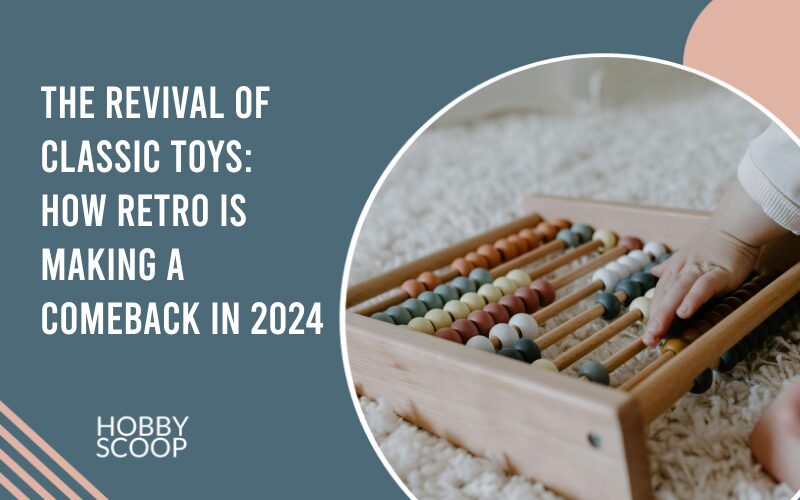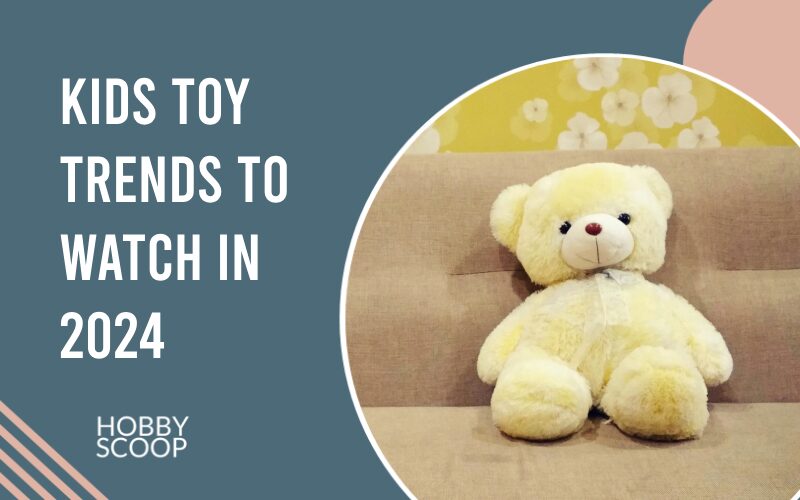In a time when technology seems to dominate every aspect of our lives, there’s a surprising, yet warmly welcomed, resurgence happening in the toy industry. Classic toys, the ones that many of us grew up with, are making a significant comeback in 2024.
But why now, and what does this revival signify for children and adults alike? Let’s delve into the heart of this trend, exploring how nostalgia is blending with contemporary values to redefine playtime.

A Nostalgic Wave in a High-Tech World
The Charm of Simplicity
In an age brimming with digital distractions, the simplicity and tangible nature of classic toys offer a breath of fresh air. These toys, devoid of screens and intricate circuits, encourage a different type of engagement – one that’s direct, hands-on, and, dare we say, more human.
Nostalgia’s Powerful Pull
For parents and grandparents, these toys are a bridge to the past, a way to share a piece of their own childhoods with the next generation. This connection isn’t just emotional; it’s a tool for bonding, storytelling, and imparting values that have stood the test of time.
The Educational Value of Time-Tested Toys
Beyond Just Play
While they may not boast AI capabilities or virtual environments, classic toys excel in fundamental educational values. They enhance cognitive development, foster fine motor skills, and stimulate creativity in ways that digital toys often overlook.
The Balance of Play
Experts argue that a balanced play diet – one that includes both traditional and tech-based toys – is key to well-rounded development. Classic toys, with their emphasis on imagination and physical interaction, provide a crucial counterbalance to the screen-centric play that dominates today’s toy scene.
Sustainability and Ethical Production
Eco-Conscious Choices
The resurgence of classic toys aligns with a growing awareness of sustainability. Many of these toys are made from natural or recycled materials, appealing to environmentally conscious consumers who prioritize longevity and eco-friendliness in their purchases.
Craftsmanship and Quality
There’s a noticeable shift back to quality over quantity. Classic toys, often more durable than their modern counterparts, embody a return to craftsmanship, where the focus is on the artistry and longevity of products rather than mere novelty.
The Global Toy Box: Classic Toys in a Modern Market
A Worldwide Trend
This resurgence isn’t confined to any single region; it’s a global phenomenon. From Europe to Asia, classic toys are regaining popularity, reflecting a universal desire to reconnect with simpler, more universal forms of play.
Cultural Heritage and Toys
In various cultures, traditional toys are being revisited not just for their play value but as a means of preserving and sharing cultural heritage. These toys offer children a glimpse into the customs, stories, and artistic expressions of different societies.
The Role of Media and Pop Culture
Retro is Trendy
Pop culture has played a pivotal role in this revival. Movies, TV shows, and social media are increasingly spotlighting retro themes, making classic toys trendy again. This visibility not only boosts sales but also embeds these toys in contemporary cultural narratives.
The Collectors’ Influence
Adult collectors are another driving force behind this trend. Their passion for vintage toys has sparked interest across broader demographics, turning toy collecting from a niche hobby into a mainstream phenomenon.
The Future of Play: Blending Old and New
Innovative Revivals
Some classic toys are being reimagined with modern twists. Think wooden toys with smart, interactive features or classic board games with augmented reality enhancements. This fusion approach caters to nostalgic sentiments while aligning with modern tech preferences.
What This Tells Us About Tomorrow
The return of classic toys isn’t just a fad; it’s a statement about what we value in play and education. It suggests that, even as we advance technologically, there’s an enduring appeal in the tactile, the simple, and the time-tested.
The Impact on Social Skills and Interaction
Fostering Real Connections
One significant advantage of classic toys is their ability to promote face-to-face interaction. In a digital era where social skills are increasingly mediated by screens, traditional toys encourage direct communication and cooperation among peers, fostering a sense of community and shared experience.
Playtime Without Borders
Classic toys often require no language or complex instructions, making them universally accessible and promoting inclusivity. Children from different backgrounds can come together through play, learning about cooperation and empathy in a natural, unforced manner.
The Psychological Benefits of Retro Play
Stress Relief and Mental Well-being
Engaging with classic toys can be a form of mindfulness, allowing both children and adults to detach from the pressures of the digital world. The tactile nature of traditional playthings can offer a therapeutic escape, reducing anxiety and promoting mental well-being.
Boosting Creativity and Imagination
Without predetermined outcomes or digital prompts, classic toys encourage users to create their own narratives and solutions. This open-ended play nurtures creativity and imagination, crucial skills that are transferable to various aspects of life and learning.
Integration in Educational Settings
Classrooms Embrace the Classics
Educators are recognizing the value of incorporating classic toys into learning environments. These toys can serve as effective educational tools, enhancing learning through play and offering a hands-on approach to exploring various concepts, from physics to storytelling.
Supporting Diverse Learning Styles
Classic toys can cater to a range of learning styles and abilities, offering alternative pathways for students who might not thrive in traditional academic settings. By integrating these toys into educational frameworks, schools can provide a more inclusive and diverse learning experience.
The Business Perspective: Market Dynamics and Opportunities
A Lucrative Niche
The resurgence of classic toys has opened up new market opportunities for manufacturers and retailers. By tapping into the nostalgia trend, businesses can differentiate their offerings and attract a broad audience, from young families to collectors.
Innovation Meets Tradition
There’s a growing market for toys that blend traditional designs with modern features, catering to consumers who value both nostalgia and innovation. Companies that can innovate while staying true to the essence of classic toys are likely to stand out in a crowded marketplace.
In conclusion, the resurgence of classic toys in 2024 is more than a trip down memory lane. It’s a reflection of our collective desire for simplicity, quality, and meaningful connections in a fast-paced, digital age. By embracing the toys of yesteryear, we’re not just revisiting the past; we’re redefining what it means to play and learn in the modern world, ensuring that the toys we cherish today will be remembered and enjoyed by generations to come.
